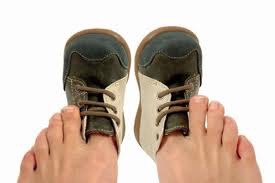BriefConsulting 1.4: Too Small Shoes

Many organizational initiatives and personal adventures feature a similar decision point. However careful the planning, some otherwise insignificant element gains prominence and threatens the entire enterprise. Going forward means accepting quite different from expected terms.
Newby limped through the entire trek, stopping to soak his bloody feet in every stream he passed. He grew more-or-less accustomed to his unintended encumbrance, as I suppose every human might be capable of tolerating even great inconvenience if pursuing grand adventure. A pragmatist might conclude that nothing’s ever perfect. A pessimist might feel personally targeted by a sadistic fate.
Some choices seem to step out-of-bounds, forcing a selection from only unwanted alternatives. Whether the adventure lives or dies lies in this one forced choice, and regardless of whether it ceases or continues, some element of loss persists. The choice seems to become not between winning and losing, but between alternative forms of defeat. Damned if you do AND damned if you don’t.
These forced choices seem to have lives far beyond the choice point. Whichever alternative selected, some sense of failure might well persist, a grieving for the once hoped-for potential which couldn’t help but evaporate once the choice was made. The three weird sister stowaways, Woulda, Coulda, and Shoulda, can destroy any possibility for delight, and I often hear about them when chatting with a client. Once they move in, whining and excuses might proliferate and from there, victimhood easily emerges.
Some clients seem to be professional victims. They have a story explaining to their eternal dissatisfaction how they fell from grace. Whether it’s their fault or not, the effect seems identical. The vitality seeps out of their enterprise. There’s never once been, in the history of this world, an enterprise that didn’t have to suffer some resident inconvenience. The inconvenience isn’t optional, though the suffering might be.
Newby became the butt of endless jokes, ridiculed as a fool by tribesmen, cast in the unwanted role of the adventure’s fool. He fooled nobody, and suffered real pain, but he’d made his choice, forced though it was, and he’d chosen to become a fool for adventure rather than the fool that caused the adventure not to happen.
Newby’s radical acceptance of the way things were might have been his greatest ally. Yea, he screwed up big time, but his taste for adventure was only seasoned by the dirt clod he’d dropped into the stew pot. He accepted the new terms of engagement and kept moving forward. His self-effacing sense of humor undoubtedly helped. He clearly had no high horse to ride on, anyway. And I’m confident that my reading his book was one Hell of a lot more comfortable of an experience than was his living the adventure he described; though probably not nearly as satisfying.
I’m usually shocked at how shocked I feel when I open the metaphorical shoebox at the beginning of my next adventure to find Too Small Shoes inside. I might well not be surprised by now. When I manage to keep my head, I might acknowledge that such encumbrances qualify as no more or less than eternal features, table stakes for the privilege of engaging in any worthwhile game. However satisfying it might feel to believe myself especially cursed in this moment, I will choose to wear those fricking shoes and I will walk considerably more than a country mile in them as long as my sense of adventure persists.
A Brief Consultation focuses on the remaining adventure rather than the one that can no longer exist. Moving seems to require the necessity of moving on, perhaps in tighter shoes than originally, naively presumed. Even baby steps can qualify as decent progress.
©2012 by David A. Schmaltz - all rights reserved


